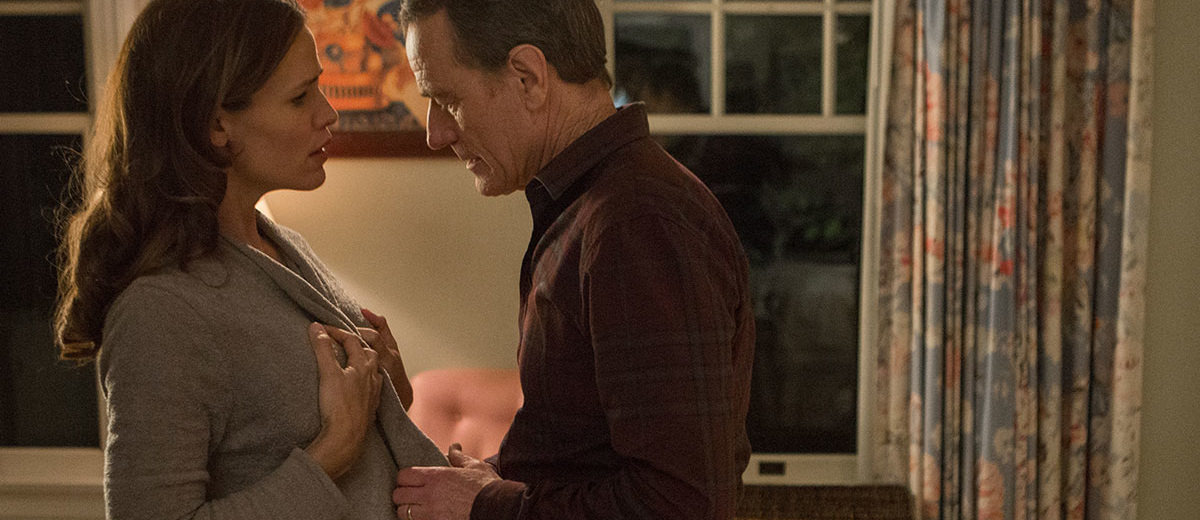Sometimes you can’t pin down logic with a nail gun and a vat of crazy glue. Over the past few years, dozens of politically inspired films have found their way to theaters. Many were specifically intended to promote a viewpoint and generate hate, yet none comes anywhere as close to describing the current political scene in the United States as the apolitical Wakefield, a film about a sadly misinformed family man cashing in on a reckless desire for escapism.
I’ll get to the political tie later on; for now, there’s insanity in an JoS. A. Bank suit. Suburban lawyer Howard Wakefield (Bryan Cranston) isn’t the biggest fish in his sea, but we can tell he’s important. Manhattan law firms don’t let average guys take the multi-million dollar cases home with them. Night has fallen by the time Howard’s train gets stuck on the tracks, and it’s way late when he finally completes the trek to his house. He has ignored calls from wife Diana (Jennifer Garner) during this time. Why? Not exactly sure, although it almost certainly has a root in the type of spousal communication that he’s come to dread.
Their suburban home is a nice one; the kind of place that has some spaces their family of four never touches; this includes the unfinished room above the unattached garage that serves as communal attic/storage space. As Howard approaches the house, he spies a raccoon head for this space. Hey, if you’re not gonna use it, the raccoon sure will. Howard is in no hurry to breach the inevitable argument with Diana and instead chooses to chase the raccoon away. The attic has a circular window overlooking the house and Howard discovers comfort in semi-distant procrastination. When he wakes up the following morning still in the attic, the stakes have risen; now it’s no longer a late return, it’s a “what did you do last night?” When the police check in, the mole hill becomes K2. Howard is now a missing person. And Howard chooses to roll with it; continuing the cowardly path, he would rather abandon 95% of his life than face the music.
The vast majority of us have at one time or another indulged, privately, in the secret desire to escape our lives. I imagine this usually involves a physical relocation; Howard Wakefield escapes in a way that is everything but physical. He abandons wife, family, house and job without straying more than 50 feet from the entire lot – kudos to the police in this film; that’s some fine detective work, fellas—And, of course, there’s white privilege for you – some white homeless get permanent shelter and privacy. The oddest part is while Howard slowly devolves, he clings to the attic fiercely. Is it territorial? No, it’s more like a profound sense of schadenfreude; our candidate for most loathsome protagonist of the year needs to see his family suffer without him. Good thing there’s a big window into the collective kitchen/den/living room/dining room so Howard can indulge in all his voyeuristic needs.
Howard Wakefield is the screen embodiment of the Trump voter. I have no idea how a film written and completed long before November of 2016 became so prescient, but there is no denying the metaphor: White, successful, middle-aged man has blinders exclusively for the pain of life. Unwilling to compromise on any level, he instead, like Trump voters, makes the worst decision he can make. And, exactly like Trump voters, he completely lacks the tools or desire to evaluate his idiocy or the disastrous and far-reaching results of his decision. Instead of self-reflection, he doubles down and taunts the people interested in making (his) life better. This is my favorite part of the party of personal responsibility – take some. Take any. Own something besides a desire to troll. Instead, what do we get? “Ha ha. You lost. You’re a snowflake.” [Intended to mock the fragile  sensibilities of the anti-Trump crowd, “Snowflake” is a curious insult coming from a group that voted largely out of fear.] As the film plays out, Howard Wakefield reaches more and more into illogical madness, never once considering the mess he made. Hence, Wakefield couldn’t be more perfect in describing Trumpies – an ugly clan of phobic, self-centered, self-destructive haters.
sensibilities of the anti-Trump crowd, “Snowflake” is a curious insult coming from a group that voted largely out of fear.] As the film plays out, Howard Wakefield reaches more and more into illogical madness, never once considering the mess he made. Hence, Wakefield couldn’t be more perfect in describing Trumpies – an ugly clan of phobic, self-centered, self-destructive haters.
Personally, I loved this film. But I loved it because I see the near-perfect metaphorical reflection of Wakefield every day in the news. Obviously, others may take a different lesson from this film – one that involves a fairly awful man making a series of selfish and irresponsible decisions all because he doesn’t like being nagged. In either case, this is not the film you emerge from the theater thinking, “boy, what a ride! I can’t wait to see it again!” You’ve been warned.
Giving up aligned with Howard’s dreams
Trading fam for cobwebbed attic beams
But this untrue now tried
Has enormous downside
Dumpster cat food is not all that it seems
Rated R, 106 Minutes
D: Robin Swicord
W: Robin Swicord
Genre: Crazy man, crazy country
Type of person most likely to enjoy this film: People who see the Trump in this one
Type of person least likely to enjoy this film: Loving housewives



